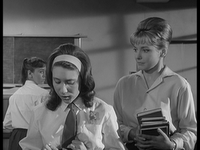
Salvation Films, a UK-based video company specializing in cult films, releases British exploitation films under their "Jezebel" imprint with the tagline "Sexy Retro from the Saucy Seventies," attempting to evoke freewheeling, mod visions of Swinging Britain through colorful, retro package design and hot-cha-cha copy, however, the films included on their Sex-a-Go-Go 3-DVD set, all made before the seventies, suggest at the very least that exploitation in Britain took awhile before finally hitting its stride (at least in comparison with the trailers for other, later films the set includes on the discs). None of the films on this set are truly memorable, but all have their interest: the latest film on the set to appear, 1969's Zeta One, an improbable spoof of both sci-fi and spy films, is the film that shows the most skin (and some endearingly cheesy costuming and set design) and features a performance by Charles Hawtrey, the comedian best known for his work in the low-brow, Benny-Hill-esque Carry On films; while Secrets of a Windmill Girl (1966) began life as an attempt by producers Tony Tenser and Michael Klinger, who, as the Compton Cinema Group, had acquired London's Windmill Theatre (from the thirties to the sixties a London institution with its distinctive brand of spicy variety theatrical programs), to document the Windmill "revudeville" shows and ended as the story of a dancer's rise and fall from Windmill girl to stripper, and featured an early performance by Pauline Collins, an actress who later established herself (and received an OBE) through prestigious television and Broadway performances. Earliest, lowest on the meter in terms of salaciousness, and to my mind the most interesting is 1963's The Yellow Teddybears, the focus of today's discussion.
Painfully earnest and preachy (and -- unless we are talking about a "Continental" version of this film which also circulated for a while that featured spliced-in scenes with completely different actors -- without nudity or really any suggestive content) the film is a drama about premarital sex among teenage girls who go to a particular suburban school. The title refers to small teddy-bears which are worn by a clique of girls at the school, the significance of which is inadvertently found out by their biology teacher (Jacqueline Ellis): only girls who have slept with a boy may join the club and wear the insignia. Only a few years out of university herself and also sexually experienced, she is shocked, not because these girls are having sex, but because they are having sex for the wrong reasons, and she confronts them in class for using sexuality for competitive and status purposes instead of its deeper and more personal significances. Meanwhile, one of the "teddybears," Annette Whitley, has been keeping her pregnancy a secret, and when her attempt to obtain an abortion is discovered by her father, she runs away to London, and her enraged father blames the school for corrupting his daughter's morals.
The final scene which unfolds from this development lays the film's agenda out on the table for you, as Ellis is called to a meeting with the headmistress and the board of governors of the school for her remarks to the Teddybears, and the scene is a veritable kangaroo court of the forces of hypocrisy, respectability, and repression versus Ellis's honesty, understanding and candor, as her frank admission of having had sexual intercourse before marriage (with, it is implied here, her fiance who is a drawing teacher at the school), which was made to the girls as part of her advice against promiscuity, is inflated into charges of corrupting morals by a group of self-righteous characters obsessed with what effect this scandal might have on the school. Meanwhile a subplot concerns Whitley's classmate (Georgina Patterson) who, having sat in the bedroom with her boyfriend while he sleeps off too much drink at a party, is then mistakenly considered to have qualified for the wearing of a teddybear.
As it happens, I watched this film as the US Food and Drug Andiminstration approved a new vaccine for human papilloma virus (HPV), a sexually-transmitted disease which can lead to cervical cancer. The requirement that the drug be administered to girls before they are sexually active has occasioned a furor among parents and religious groups who are worried that inoculation against a disease that leads to some 4000 deaths a year from cancer be construed to make premarital sex seem "okay." It is a little depressing waching this film and noticing that the attitudes it shows -- that sex before marriage is some sort of taboo which must be enforced by ignorance and vulnerability to negative consequences -- are still with us today. The point that social pressure to be sexually attractive and active must be met by a response more compassionate than rigid repression allows is impassionedly made by Ellis to the governors, who present a wall of hostility, arrogance, and superiority: "You ask for charity, we ask for chastity," says one of them, a smarmy lawyer played by Raymond Huntley. Meanwhile, Whiteley, last seen hitching a ride with a creepy, randy young truckdriver on her way to an uncertain future in London, is deemed not of great importance to the school's governors, since she has left the school and the district; the possibility of scandal besmirching respectability trumping any compassionate considerations.
Director Robert Hartford-Davis never made much of a name for himself as a director, going on to make a number of other exploitation films before going to America where he directed television before passing away in the late seventies.
No comments:
Post a Comment